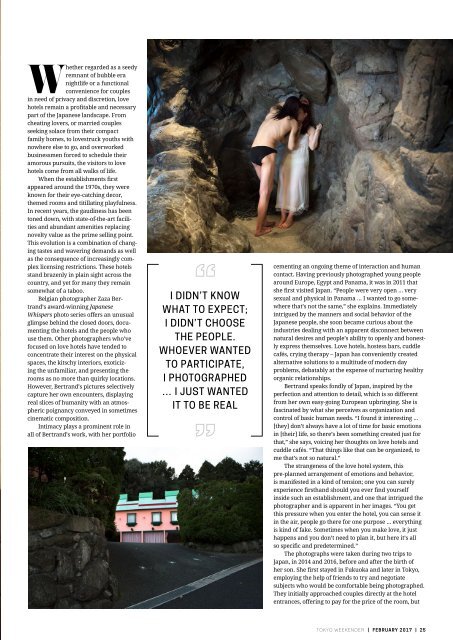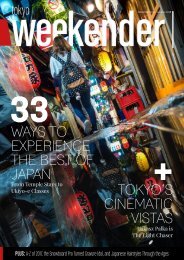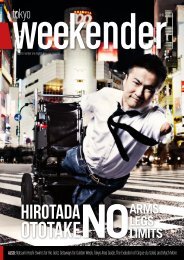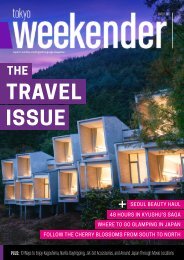Tokyo Weekender - February 2017
The People of Okinawa Meet Three Locals Who Represent the Colorful and Creative Energy of the Islands Plus: Peek Inside Love Hotels, Snowsurfing in Fukushima, and Is Japan Biased Against Those with Disabilities?
The People of Okinawa
Meet Three Locals Who Represent the Colorful and Creative Energy of the Islands
Plus: Peek Inside Love Hotels, Snowsurfing in Fukushima, and Is Japan Biased Against Those with Disabilities?
Create successful ePaper yourself
Turn your PDF publications into a flip-book with our unique Google optimized e-Paper software.
Whether regarded as a seedy<br />
remnant of bubble era<br />
nightlife or a functional<br />
convenience for couples<br />
in need of privacy and discretion, love<br />
hotels remain a profitable and necessary<br />
part of the Japanese landscape. From<br />
cheating lovers, or married couples<br />
seeking solace from their compact<br />
family homes, to lovestruck youths with<br />
nowhere else to go, and overworked<br />
businessmen forced to schedule their<br />
amorous pursuits, the visitors to love<br />
hotels come from all walks of life.<br />
When the establishments first<br />
appeared around the 1970s, they were<br />
known for their eye-catching decor,<br />
themed rooms and titillating playfulness.<br />
In recent years, the gaudiness has been<br />
toned down, with state-of-the-art facilities<br />
and abundant amenities replacing<br />
novelty value as the prime selling point.<br />
This evolution is a combination of changing<br />
tastes and wavering demands as well<br />
as the consequence of increasingly complex<br />
licensing restrictions. These hotels<br />
stand brazenly in plain sight across the<br />
country, and yet for many they remain<br />
somewhat of a taboo.<br />
Belgian photographer Zaza Bertrand’s<br />
award-winning Japanese<br />
Whispers photo series offers an unusual<br />
glimpse behind the closed doors, documenting<br />
the hotels and the people who<br />
use them. Other photographers who’ve<br />
focused on love hotels have tended to<br />
concentrate their interest on the physical<br />
spaces, the kitschy interiors, exoticizing<br />
the unfamiliar, and presenting the<br />
rooms as no more than quirky locations.<br />
However, Bertrand’s pictures selectively<br />
capture her own encounters, displaying<br />
real slices of humanity with an atmospheric<br />
poignancy conveyed in sometimes<br />
cinematic composition.<br />
Intimacy plays a prominent role in<br />
all of Bertrand’s work, with her portfolio<br />
I DIDN’T KNOW<br />
WHAT TO EXPECT;<br />
I DIDN’T CHOOSE<br />
THE PEOPLE.<br />
WHOEVER WANTED<br />
TO PARTICIPATE,<br />
I PHOTOGRAPHED<br />
… I JUST WANTED<br />
IT TO BE REAL<br />
cementing an ongoing theme of interaction and human<br />
contact. Having previously photographed young people<br />
around Europe, Egypt and Panama, it was in 2011 that<br />
she first visited Japan. “People were very open ... very<br />
sexual and physical in Panama ... I wanted to go somewhere<br />
that’s not the same,” she explains. Immediately<br />
intrigued by the manners and social behavior of the<br />
Japanese people, she soon became curious about the<br />
industries dealing with an apparent disconnect between<br />
natural desires and people’s ability to openly and honestly<br />
express themselves. Love hotels, hostess bars, cuddle<br />
cafés, crying therapy – Japan has conveniently created<br />
alternative solutions to a multitude of modern day<br />
problems, debatably at the expense of nurturing healthy<br />
organic relationships.<br />
Bertrand speaks fondly of Japan, inspired by the<br />
perfection and attention to detail, which is so different<br />
from her own easy-going European upbringing. She is<br />
fascinated by what she perceives as organization and<br />
control of basic human needs. “I found it interesting ...<br />
[they] don’t always have a lot of time for basic emotions<br />
in [their] life, so there’s been something created just for<br />
that,” she says, voicing her thoughts on love hotels and<br />
cuddle cafés. “That things like that can be organized, to<br />
me that’s not so natural.”<br />
The strangeness of the love hotel system, this<br />
pre-planned arrangement of emotions and behavior,<br />
is manifested in a kind of tension; one you can surely<br />
experience firsthand should you ever find yourself<br />
inside such an establishment, and one that intrigued the<br />
photographer and is apparent in her images. “You get<br />
this pressure when you enter the hotel, you can sense it<br />
in the air, people go there for one purpose ... everything<br />
is kind of fake. Sometimes when you make love, it just<br />
happens and you don’t need to plan it, but here it’s all<br />
so specific and predetermined.”<br />
The photographs were taken during two trips to<br />
Japan, in 2014 and 2016, before and after the birth of<br />
her son. She first stayed in Fukuoka and later in <strong>Tokyo</strong>,<br />
employing the help of friends to try and negotiate<br />
subjects who would be comfortable being photographed.<br />
They initially approached couples directly at the hotel<br />
entrances, offering to pay for the price of the room, but<br />
TOKYO WEEKENDER | FEBRUARY <strong>2017</strong> | 25

















